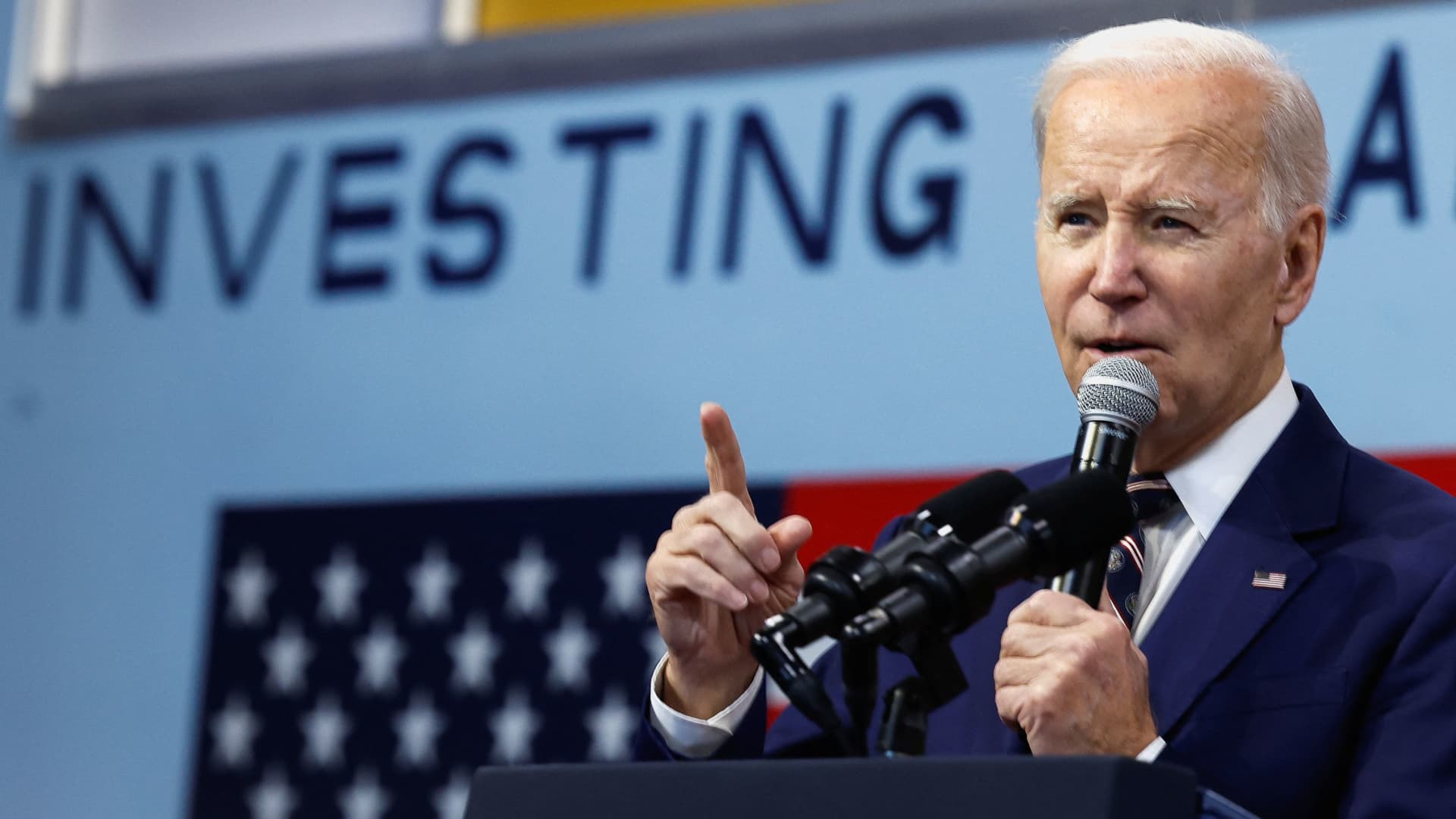
U.S. President Joe Biden delivers remarks about his budget for fiscal year 2024 at the Finishing Trades Institute in Philadelphia, Pennsylvania, March 9, 2023.
Evelyn Hockstein | Reuters
President Joe Biden’s 2024 budget proposals contain several proposals that could hit small businesses right where it hurts — their wallets.
Proposals in the budget include boosting the top capital gains rate for income over $1 million, eliminating the so-called “step-up in basis” loophole, expanding who has to pay investment income tax and at what rate, and bumping up the corporate tax rate.
“The White House’s 2024 budget proposal contains $2.5 trillion in harmful tax hikes that would crush Main Street’s ability to grow and create jobs,” said Brad Close, NFIB president, in a statement detailing its campaign to prevent the measures from becoming law. “Some of these tax increases are again being wrongly characterized as the closing of a ‘tax loophole’ and would directly hit small businesses and compound with other rate hikes,” Close said.
Although the budget comes at a time when many small businesses are feeling thrown under the bus by the effects of inflation, hiring pressures and other adverse business conditions, the good news is that tax experts are circumspect about the chances of Biden’s wish list passing as proposed.
For one, many of the provisions within the budget have been floated before, and a divided Congress lessens the likelihood they’ll be adopted without revision. Even so, the budget represents efforts to rebalance some of the cuts enacted by The Tax Cuts and Jobs Act of 2017, especially for higher income individuals, said Eric Hylton, national director of compliance at alliantgroup, a Houston-based consultancy.
Currently, the top individual rate is 37% for income over $578,125 for a single taxpayer, or $693,750 for married couples filing jointly. Biden’s proposal would boost the top individual rate to 39.6% and change the threshold to $400,000 for a single taxpayer and $450,000 for a married couple filing jointly. The rate is already set to increase at the end of 2025, when certain provisions of The Tax Cuts and Jobs Act sunset, but this proposal would make it effective for taxable years beginning after December 31, 2022, and it could ensnare more businesses.

While Congress may be more inclined to move ahead with measures that apply more broadly to wealthy individuals, “there’s going to be a lot of debate as to what should go forward,” said Hylton, a former IRS Commissioner of the Small Business/Self Employed Division.
it’s important for small business owners to be aware of what’s being floated, especially since certain provisions that apply more directly to business operations are likely to rear their head at a later time and the recent tax season included some ugly surprises for small businesses related to recent changes in tax law. “These ideas don’t truly go away; they just go into hibernation until somebody else comes along,” said Ray Beeman, leader of Ernst & Young’s Washington Council.
Here are five provisions business owners should be aware of in President Biden’s budget:
A higher capital gains tax rate would be bad for business sellers.
Biden’s proposal would raise the top marginal rate on long-term capital gains and qualified dividends to 44.6% for income over $1 million, up from 23.8%, including the net investment income tax. The impact would be significant for many small business owners who want to sell businesses, especially the scores of Baby Boomers who are aging out, said Brad Sprong, national industry tax leader for KPMG Private Enterprise. “They don’t have big 401(k) accounts; they have equity in the business, so selling the business could mean an even bigger hit. I think that would be tough for people and it will impact their retirement.”
Eliminating the “step-up in basis” would hit family businesses.
Biden is once again floating the idea of ending the “stepped-up basis” rule that allows preferential tax treatment for assets held until death.
Current rules exempt capital gains on assets that a taxpayer does not sell before the end of his or her life, according to the Institute on Taxation and Economic Policy, a non-profit, non-partisan tax policy group.
The proposed change would be especially impactful when family-business assets are passed to the next generation, since there are few exceptions to the capital gains tax consequences, according to the NFIB, which opposes the change.
“That’s a factor in families transferring businesses from one generation to the other right now,” said Mark Prater, managing director with PwC’s Tax Policy Services team. It would be a double-whammy for small businesses, he said, if the other proposal to increase the capital gains rate moves forward.
Still, Biden’s budget partially mitigates these concerns by exempting $5 million of unrealized gains per individual and effectively $10 million per married couple, according to an analysis from the Institute on Taxation and Economic Policy. “The President also proposes allowing any family business (including farms) to delay the tax if the business continues to be family-owned and operated,” the blog said.
Property owners could lose leverage in real estate transactions.
The budget once again seeks to eliminate so-called 1031 like-kind exchanges of more than $500,000 for each taxpayer, or $1 million for married individuals filing a joint return. Under current law, if certain conditions are met, a property owner can sell and buy another piece of real estate for business or investment purchase and defer paying taxes on the initial gain, Sprong said. If that benefit is eliminated, certain small businesses would lose the ability to leverage their capital in this way.
A higher corporate tax rate would hurt businesses that don’t use a pass-through structure.
Biden is proposing that the corporate tax rate be increased to 28% from 21%. The majority of small businesses are pass-through businesses that are not subject to the corporate income tax, but for companies that are, the increase would be meaningful, tax experts said. Before moving ahead, Congress would need to consider how this pits the U.S. against other developed nations, Sprong said. “You wouldn’t want to be an outlier.”
Potentially higher net investment income tax.
Biden’s proposal would increase the 3.8% net investment income tax rate on small business income over $400,000 to 5%. Many small businesses today don’t pay this tax, but if the plan passes, they would not only pay, but at a higher rate than what’s currently in place, Beeman said.
